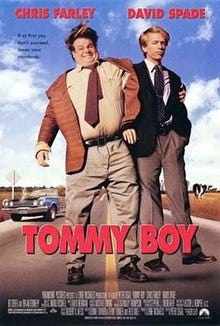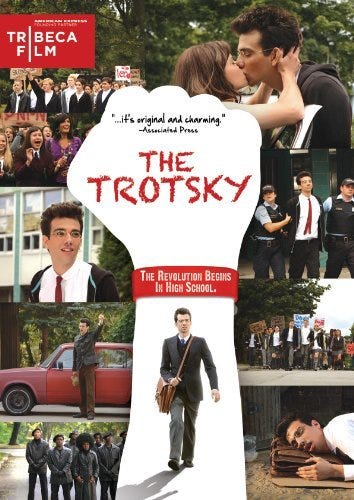Tommy Boy vs. The Trotsky
Two movies, made decades apart, share the same set-up.
Tommy Boy is a touchstone American comedy from 1995 that migrated from video store shelves to cable replays to streaming lists. It makes audiences regret the young death of comedian Chris Farley, who might have gone onto to funnier things.
The Trotsky is a movie I hadn’t even heard of until stumbling on it while looking for potential family movies to watch. It’s a 2009 Canadian film about a teenager who is convinced he is the reincarnation of communist leader Leon Trotsky.
The Middlebrow Family started Sunday night by watching Tommy Boy but when the Renaissance Son wandered off to play video games, The Scholar Wife and I switched to The Trotsky. Crazily, the two movies share similar set-ups. We join Tommy Boy as the titular character graduates from Marquette University after years of trying. He then goes home to Sandusky, Ohio to take a job at the auto parts plant run by his father, the third in the line of men who had inherited the CEO role of the industrial company. Tommy’s father immediately slots his son into an executive role, to the annoyance of the snide but hard-working young executive played by David Spade, who realizes that having the wrong father is a ceiling on his career.
A fun line in this sequence, by the way, comes when Tommy explains that lots of people take 7 years to graduate from college and Spade’s character quips, “Yes, they’re called doctors.” In any event, we’re not meant to dwell too much on how unfair it all is that some people have to toil for few rewards while other people coast by on family ownership. This is an American comedy, after all, so the story is all about how Tommy is going to rise to the occasion to become the next leader that the family business needs.
In The Trotsky we meet Leon, a high school senior working at his father’s textiles factory in Montreal. Leon wants to work on the floor, with the other garment workers, while his father is grooming him for office work, upstairs. Leon’s father hopes that the drudgery of cutting cloth and loading pallets will drive his son into the white collar world, but Leon sees an opportunity to make common cause with labor and to organize his father’s workers against him.
Here, the movies diverge. Tommy’s father dies and Tommy has to grow up, with the help of the Spade foil, to save the family company from oblivion. Obviously, he accomplishes this, validating the notion birthright status along the way. Well, maybe that’s overstating things — it’s a broad comedy meant to end in a happy way and that means the hero has to triumph and be better for it. Questions about right, wrong and fairness are not dwelled on because that would kill the mood.
Now, shift forward 14 years and up a few miles from Sandusky to Montreal and we get a very different story — Leon and his father having a falling out over Leon’s attempts to unionize the family business. Leon’s father reads a biography of Trotsky and confronts his son with the truth that the real Trotsky was not coddled at a fancy boarding school and he transfers his son from private to public school. There, Leon confronts a school administration bent on managing the student body of a failing inner city school with harsh discipline. He reacts by attempting to unionize the student body. In that quest, he confronts a dialectic — are the students bored, which is a state that they can be roused from by political commitment, or apathetic, a state from which humans cannot be motivated? Leon believes they are bored. The principal thinks they are apathetic.
In his journey, Leon eventually wins his father’s respect, but neither compromise their beliefs. They take separate paths, nothing is inherited or presumed deserved and the message of the film, also a comedy but more satirical, is that change is good and necessary.
Naturally, these two movies have nothing to do with each other, but it was a fortuitous coincidence that we started watching one, wound up watching the other, and that both shared such similar set-ups. One affirms the world as it is, the other insists on changing it and both are very funny. But you probably haven’t seen The Trotsky so check that out — it’s streaming on Peacock.


Jay Baruchel has always simmered beneath the surface of superstardom. I was living in Montreal a year after The Trotsky came out and there was a sense there that he was going to break out and become huge. Never really happened. We cast him in an addias spot in 2008 and I had zero idea who he was.